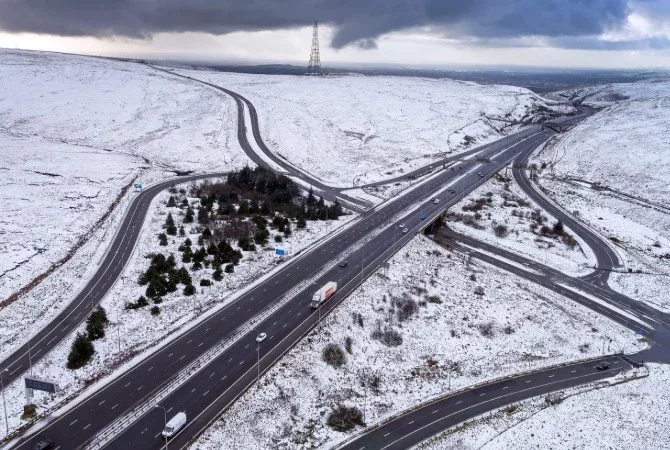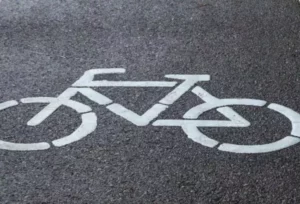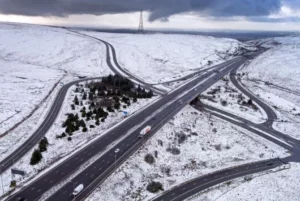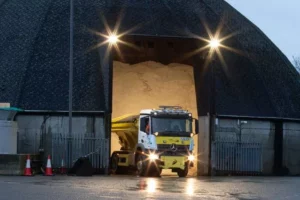Winter gritting routes need to change to not just favour ‘getting men to work in cars,’ according to a Cambridgeshire County Councillor.
Cllr Alex Beckett said the network is “primarily focused on getting men to work in cars” and that can “leave active travel users counting the costs with broken limbs”.
The comments, from the Liberal Democrat chair of the county council’s highways and transport committee, were described as “bizarre” by the leader of the Conservative opposition, Cllr Steve Count, who claimed the changes being proposed amounted to a “25 per cent cut”.
Cllr Beckett described that as “utterly wrong” and “deliberately disingenuous” but said the routes gritted were long overdue a review, reports the Cambridge Independent.
The disagreement came as the county council set its budget, agreeing a 4.99 per cent increase to council tax that will leave the average Band D household paying an extra £73 for its services.
The joint administration of Liberal Democrat, Labour and Independent councillors agreed to take out £300,000 from the highways budget by undertaking “a risk-based review of the network covered by winter gritting to ensure it is optimised and giving value for money”.
But they added a “£600,000 reserve to mitigate against risks of difficult winters on council services, particularly in the highways and gritting departments”.
Cllr Beckett, who said this meant £300,000 more was available if required, argued current routes need to work better for active travel users – cyclists and pedestrians – and for those engaged in social care, rather than being focused on business users.
He told councillors: “We do need to review the network. It’s currently years out of date and primarily focused on getting men to work in cars. It’s a network focused on businessmen and councillors, not representative of normal people and their lives.
“There is a large body of evidence that gritting routes defined like this can be sexist and can leave active travel users counting the costs with broken limbs.
“The DfT [Department for Transport] also gives us funding based on having a fully developed, regularly updated resilience network. I’m sure that none of us would want to risk that funding.”
Cllr Steve Tierney (Con, Wisbech West) said Cllr Beckett “seems to think only men drive to work and then amusingly accuses others of sexism”.
He added: “I can assure him there’s no shortage of female drivers going to work, certainly not where I live, and it’s an odd view for the chairman of highways.”
A furious row on the issue broke out on Twitter, in which Cllr Count told Cllr Beckett: “Cannot agree with you that you can cut winter gritting of roads because ‘it’s sexist, because more men drive to work.”
Cllr Beckett told him: “It might be surprising to you but prioritising routes used by business over those used for social caring responsibilities can disproportionately affect women. (And yes I really do think we need to get more of us men into social caring responsibilities).”
And he posted a link to a blog by US consulting firm FSG, which reported how a Swedish gender equality initiative team had explored whether snow clearing was sexist.
“Sure enough, they found the routine of clearing snow typically benefited men over women,” wrote FSG. “In the winter, snow was cleared first on main roads leading into the city, benefiting commuters – who were mostly men. Foot and cycle paths were cleared last – not so good for pedestrians and cyclists, who were very often women travelling with children in pushchairs.”
The study found 79 per cent of pedestrian injuries occurred in winter, and 69 per cent of those affected were women. Clearing paths first halved accidents and saved the local government money, reported FSG.
Cambridgeshire’s 37 vehicles currently grit 34 per cent of the road network in the county, according to the council’s budget papers, and have primary and secondary routes that they can cover.
The papers note: “This is high when compared to most other authorities who treat around 25 per cent. A review of the network could achieve financial savings without a significant increase in risk to road users or the authority.”
The gritters are assigned to routes based on local forecasts in three gritting areas – Fenland and East, Huntingdonshire and South, and Cambridge city – meaning if the temperature varies, according to 12 weather stations around the county, some areas may be gritted and others not.
In Cambridge, the council has two quad bikes that treat over 50km of cycleways and a team of about 70 volunteers who salt the pavements.





















